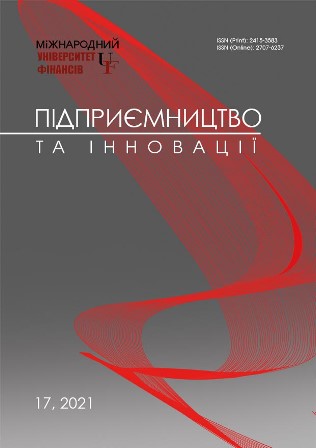SUSTAINABLE DEVELOPMENT PARADIGM ACTUALIZATION FROM A POSITION OF ITS HUMAN-CENTRISM
Abstract
It is determined that the active acceleration of economic processes due to the development of production infrastructure: technology, communications, transport, etc., orients economic agents to accelerate all operational processes, encourages to act quickly, aggressively, often not focusing on the future, especially given sufficient experience in generation of synthetic alternatives to endangered resources. On the one hand, the trend has a positive impact in terms of impetus to innovation, modernization, development, progress, etc., on the other – it can deepen the problem of limited resources, creating and / or exacerbating existing threats to economic, social and environmental security. The need for stabilization is substantiated, which will balance the optimal possible satisfaction of the needs of industrial and personal consumption with the rational non-predatory use of resources, and at the same time will satisfy the conditions of development on the basis of sustainability. Quite familiar, especially to domestic science with its lexical ambiguity of borrowed terminological constructs and the tendency to narrowly interpret them, provoke reductionism, hypertrophy or, in general, distorted interpretation of the essence of categories, ambiguity necessitates the formulation of adequate logical and substantiated concept of sustainable development, which will take into account the specific features and characteristics of our economic system on the basis of the requirements for its efficiency determined by us above, namely: timeliness of innovations, their specific feasibility and the possibility of their perception by the system. The the study of genesis of approaches to the sustainable development paradigm allows to substantiate human-centric theoretical model of sustainable development, as human consciousness becomes a driving force of nature transformation in their interests The irrationality of the sociocentric interpretation of the sustainable development concept from the point of view of the impossibility of its achievement. The study substantiates the aberrations of interpretation and implementation of the sustainable development concept, namely: politicization; hypertrophy; hyperbolization; imitation; reduction; reversible efficiency, the identification and systematization of such rationalizes the formulation of the theoretical sustainable development model. The human-centric paradigm of sustainable development substantiated in the research is actualized not only from the position of adding a central system-forming element, but also in terms of agent retrospection: separate integral systems of another order, which give the system properties of completeness and complexity.
References
Яловий, Г. К., Ю. О. Єрешко. (2015). Методологія науково-технологічного розвитку в концепції постіндустріального суспільства. Економічний вісник Національного технічного університету України Київський політехнічний інститут, 12, 71-82.
Earth Overshoot Day 1970-2020 https://www.overshootday.org/newsroom/past-earth-overshoot-days/
WCED, S. W. S. (1987). World commission on environment and development. Our common future, 17(1), 1-91.
Grober, U. (2007). Deep roots-a conceptual history of'sustainable development'(Nachhaltigkeit).
Blewitt, J. (2018). Understanding sustainable development. Routledge. ISBN 9780415707824.
Evelyn, J. (1972). Sylvia, or a discourse of forest-trees, and the propagation of timber in his majesties dominions.
Світовий центр даних. Концепція сталого розвитку. http://wdc.org.ua/uk/node/356
Вернадский, В. (1944). Несколько слов о Ноосферe. "Успехи современной биологии" 18 (2), 113-120 http://vernadsky.lib.ru/e-texts/archive/noos.html
BI DSS Group (06.12.19). Концепція Ноосфери та мережеві ергатичні організми, мережево-центричні системи і війни, Інтернет речей. https://dss-bi.blogspot.com/2019/05/blog-post_17.html
Turner, R. Kerry (1988). Sustainability, Resource Conservation and Pollution Control: An Overview. Sustainable Environmental Management. London: Belhaven Press.
Georgescu-Ruegen, N. (1971). The entropy law and the economic process (No. 04; HB171, G4.).
O'Riordan, T. (1988). The politics of sustainability.
Earth Charter Initiative. What is the Earth Charter? https://earthcharter.org/about-the-earth-charter/
UN.org Sustainable Development Goals. https://www.un.org/sustainabledevelopment/sustainable-development-goals/
Stosec (16.08.2020) Фрази дня. Джим Рон. https://stosec.com/jim-rohn-2/
Boehmer-Christiansen, S. (2002). The geo-politics of sustainable development: bureaucracies and politicians in search of the holy grail. Geoforum, 33(3), 351-365.
O'Connor, M. 2006. The 'four spheres' framework for sustainability. Ecological Complexity 3:285-292
Petruzzello, M. Plastic Disaster:you’re your bags and bottles polute the oceans. https://www.britannica.com/story/plastic-disaster-how-your-bags-bottles-and-body-wash-pollute-the-oceans
The Independent. Plastic bags were created to save the planet. https://www.independent.co.uk/climate-change/news/plastic-bags-pollution-paper-cotton-tote-bags-environment-a9159731.html
Yalovyj, G, & Yereshko, J. (2015). Methodology of scientific and technological development in the concept of post-industrial society. Ekonomichnyj visnyk Natsionalnogo tehnichnogo universytetu Ukrainy, (12), 71-82.
Earth Overshoot Day 1970-2020 https://www.overshootday.org/newsroom/past-earth-overshoot-days/
WCED, S. W. S. (1987). World commission on environment and development. Our common future, 17(1), 1-91.
Grober, U. (2007). Deep roots-a conceptual history of'sustainable development'(Nachhaltigkeit).
Blewitt, J. (2018). Understanding sustainable development. Routledge. ISBN 9780415707824.
Evelyn, J. (1972). Sylvia, or a discourse of forest-trees, and the propagation of timber in his majesties dominions.
Svitovyj tsentr danyh. The concept of sustainable development. http://wdc.org.ua/uk/node/356
Vernadskyj, V. (1944). A few words about Noosphere. Uspiehi sovremennoj biologii, 18 (2), стр. 113-120 http://vernadsky.lib.ru/e-texts/archive/noos.html
BI DSS Group (06.12.19). The concept of the Noosphere and the hemispheric organisms, the hemispheric systems and the Internet of things. https://dss-bi.blogspot.com/2019/05/blog-post_17.html
Turner, R. Kerry (1988). Sustainability, Resource Conservation and Pollution Control: An Overview. Sustainable Environmental Management. London: Belhaven Press.
Georgescu-Ruegen, N. (1971). The entropy law and the economic process (No. 04; HB171, G4.).
O'Riordan, T. (1988). The politics of sustainability.
Earth Charter Initiative. What is the Earth Charter? https://earthcharter.org/about-the-earth-charter/
UN.org Sustainable Development Goals. https://www.un.org/sustainabledevelopment/sustainable-development-goals/
Stosec (16.08.2020) Фрази дня. Джим Рон. https://stosec.com/jim-rohn-2/
Boehmer-Christiansen, S. (2002). The geo-politics of sustainable development: bureaucracies and politicians in search of the holy grail. Geoforum, 33(3), 351-365.
O'Connor, M. 2006. The 'four spheres' framework for sustainability. Ecological Complexity 3:285-292
Petruzzello, M. Plastic Disaster:you’re your bags and bottles polute the oceans. https://www.britannica.com/story/plastic-disaster-how-your-bags-bottles-and-body-wash-pollute-the-oceans
The Independent. Plastic bags were created to save the planet. https://www.independent.co.uk/climate-change/news/plastic-bags-pollution-paper-cotton-tote-bags-environment-a9159731.html



